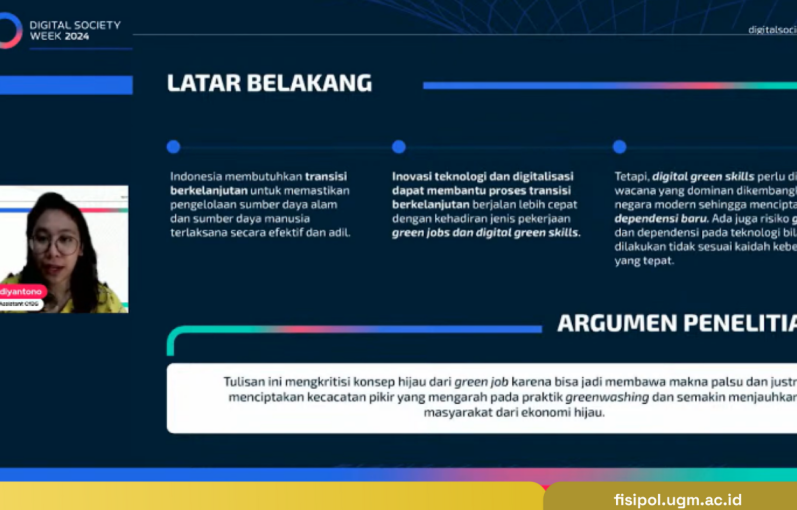
Yogyakarta, 2 October 2024─Increasingly sophisticated digital technology innovations have been widely utilized in almost all aspects of human life, including encouraging a sustainable environment. To dissect the relationship between digital technology and sustainability, the Center for Digital Society Universitas Gadjah Mada (CfDS UGM) specifically organizes research dissemination with the theme “The Linkage between Digital Technologies and Sustainable Environment”. The dissemination is part of the Digital Society Week 2024 series held on Wednesday (2/10) online through YouTube.
Digital technologies can help drive a sustainable transition process that works to ensure effective and equitable governance of natural and human resources. Especially with the emergence of the concepts of green jobs and green digital skills. Tane Hadiyantono, CfDS UGM Researcher, explained that green skills help adapt products, services, and processes to climate change. “Meanwhile, green digital skills are specific skills to develop net-zero technology,” said Tane.
Green skills and green digital skills are closely related to the 17 Sustainable Development Goals (SDGs), such as SDG 8 on Decent Work and Economic Growth, SDG 9 on Industry, Innovation and Infrastructure, SDG 11 on Sustainable Cities and Communities, and SDG 13 on Climate Action. In addition, Tane also said that the government, through the National Development Planning Agency (Bappenas), has mapped out the types of professions that refer to green jobs. Both underscore the urgency for the workforce to develop green skill and green digital skills.
“Findings from various studies show that Indonesia lacks talents in the fields of Science, Technology, Engineering, and Mathematics or STEM,” said Tane. Skills in these fields are needed to support digital green skills closely related to technology. This could lead to foreign STEM talents being brought into Indonesia. Not only foreign talent Tane is also worried that the government will import too much technology and become dependent on the technology supplier.
“This dependency has the potential to create a resource curse, which is a phenomenon where a country with abundant natural resources is unable to properly manage its natural resources,” Tane explained. In relation to digital green skills, Indonesia’s economy and talents can lose out if Indonesia cannot properly manage its natural and human resources.
